- Home
- Johnny D. Boggs
Northfield Page 9
Northfield Read online
Page 9
“Kill that son-of-a-bitch!” Bob’s voice boomed inside the bank.
Which is what I figured, now, I had to do.
I raised my Smith & Wesson, pulled the trigger, figuring the capt’n’s rules didn’t apply no more that things had gone to hell. Nailed that running son-of-a-bitch in the back, through the shoulder blade, heard him gasp, saw him stagger, blood spurting, but damned iffen that rascal didn’t somehow manage to keep his feet. He was running south, had a funny way of running, like his legs wasn’t bending or something, maybe from fright. I thumbed back the hammer on my .44, but the banker was gone.
“Damnation!” I said, heard Bob Younger’s shouting from inside, and I rushed up the steps and back to the vault.
The older banker, he remained where I had left him, on his knees behind the counter, eyes wide, hands raised but shaking like some drunk’s. The younger guy, the one with the dark beard who had tried to lock me in the vault, he lay inside the vault, bleeding from where Frank had practically stoved in his head with his big Remington pistol.
“You get him?” Bob asked.
“Chicken fled the coop,” I answered.
“Well, hell, Charlie, that’s all right!” He grinned slightly at the noise from the battle being waged outside. “Seems the alarm’s already been given.”
Bob is Capt’n Cole’s kid brother, not a bad fellow at all, and I’d call him a man to ride the river with. All of them Youngers was.
I growed up near Commerce down in the Indian Nations, one of a dozen kids, though I had been pretty much on my own since the summer of ’60 when I got adopted out—bartered, reckon you’d have to call it—to work on a farm, our family being dirt poor like most folks down in the Nations. Mama was a Cherokee. Pa was a squawman, farmer when he wasn’t running whiskey for some white fellers over in Fort Smith. That left me nothing more’n white trash. Or a red nigger. Half-breed. Injun. Puke. Ruffian. You name it, but iffen you do it to my face, or if even I just gets word of it, I’ll kill you. A year or so later found me in Missouri, and that’s where I come across Cole Younger’s daddy.
He had been shot dead, thrown in some bar ditch. Me and the wife of this farmer I was working for—Washington Wells was his name, and I’d later come to use Sam Wells as one of my handles when on the dodge. Anyway, me and Mrs. Wells seen the body, and I’d covered him up with my saddle blankets and waited while Mrs. Wells rode to Westport to fetch help. It was one of them sultry days in June, threatening to rain. I just stayed with the body, by lonesome, to keep animals from the poor soul. Nothing anybody half decent wouldn’t do, but these wasn’t decent times in Missouri. Mr. Younger had been a wealthy man, a powerful one, with sons favoring Southern sympathies, same as me, and I reckon that’s why them Kansas Redlegs or Union vermin or Abolitionists or whoever killed him. That unfortunate circumstance is how I come to meet Thomas Coleman Younger. Later, Mr. and Mrs. Wells brung me over to Lee’s Summit to meet the Youngers. Capt’n Cole wanted to see me, to thank me personal for staying with his daddy. Capt’n Cole, he shook my hand, said he’d never forget what I done.
Shook my hand.
Me, Charlie Pitts, piece of squaw trash from the Nations, shaking hands with a rich feller like Cole Younger. Man had a strong grip.
Damned right I’d ride through hell for the capt’n. And his brothers.
“For God’s sake boys, come out!” It was Capt’n Cole’s voice. He pounded on the door with one of his pistols. “It’s getting too hot for us!”
“Frank?” Bob and I called out at the same time.
Frank James, about the coolest man in a fight I’d ever laid eyes on, let out with a curse, and kicked at the man he had buffaloed.
“The hell with this,” Bob said, grabbing the wheat sack of coin he had collected, and marched toward the door, not waiting for Frank’s orders. Mind you, Bob wasn’t scared. None of them Youngers never understood the meaning of fear, but I suspect Bob felt concern from his brothers, wondering how they fared out on the streets where the shooting was hotter than the gates of Hades.
Frank started to say something, but Bob barked out first: “My brothers are outside, Buck! Yours, too!”
Frank just stood there, gripping that big .44 till his hands shook and his knuckles turned white.
Wasn’t nothing like we had expected.
When we first left Missouri, we’d had a hell of a time, buying and racing horses, playing poker, whoring. One reason I always rode with the boys wasn’t just because of the capt’n and the way he had treated me, but because we had a fandango wherever we hung our hats. Some right interesting jollifications. We laughed a lot, too, even during the most desperate of situations. Sure, we’d fight amongst ourselves, but that was just natural. Mostly, we took things in stride, figured we wouldn’t live forever, but we’d have some laughs, spend some money, make a name for ourselves, and die game when the time come. I remember the capt’n and me, pretending to be on the scout for farms, having that exchange with the hotel landlord in Madelia about woods and such, and me, signing the guest register as Jack Ladd. Figured that’d get a chuckle out of the capt’n when we was in our room, and it sure had—Jack Ladd being one of the Pinkerton men who had raided the James farm a year or so back. I had meant to tell Frank and Jesse about that, make them two laugh, but had never gotten around to it.
Wasn’t sure now I’d ever get the chance to tell them.
Wasn’t nothing funny no more.
“It’s all gone to hell!” Frank said. “Let’s get out of here.”
He didn’t have to holler them orders at me more’n once.
“Yankee bastards!” Bob bellowed from the doorway. “They killed my horse.”
They had, too. Just shot it at the hitching rail where we had left it in front of the bank. Takes one low son-of-a-bitch to kill a horse. We never cared much for that down in the Nations or Missouri.
Capt’n Cole was hollering at his brother, telling him something, but I couldn’t make heads or tails out of nothing from all the shooting.
All right, I’ll confess that we was drunker than Hooter’s goat when we walked inside that bank, but I guaran-damn-tee you that I felt sober as a Mormon when I ran out, stopping at the door, taking in the scene. Savagerous, it was. The capt’n was bleeding from his left hip. Clell Miller’s face had been peppered by bird shot. Jesse sat on his high-stepping white horse riding up and down the streets, cutting loose with Rebel yells, firing pistols in both hands, reins in his teeth. Jim Younger galloped by, his trousers torn by pellets from a scatter-gun, and somebody from an upstairs window damned near Mowed his head off. I didn’t see Stiles, the guy who had told us how easy this affair was gonna be, not at first, then saw him lying dead.
Well, I let out a little cry of surprise right then and there. Bill Stiles—Chadwell he sometimes called hisself—was dead, him the fellow who was gonna guide us out of this place, get us home safe and rich.
“Shit and hell’s fire!” I said.
Which is what we had stepped in.
A bullet clipped the post nearby and sent splinters into my face. I snapped a shot at some kid throwing a rock as Jim Younger galloped past again, screaming at us to get on our horses and light a shuck out of this battleground.
The capt’n was there in my face, madder than a hornet. “What the hell kept you?” he hollered.
I give him a feeble answer, some excuse, ashamed of myself, and looked back inside the bank, yelling at Frank to get the rocks out of his drawers. “The game’s up, Buck!” I told him. “We got to get out of here. Bill’s dead!”
What I saw next haunts me, and I ain’t never been a man scared of apparitions and consciences and such. That cashier, the one whose throat we had nicked with a knife, whose skull we had cracked, who we had tortured and threatened to no avail—man was game as a bantam rooster though quiet and soft like most city gents—he had somehow climbed to his feet after Frank left him in the vault.
Frank busied hisself stuffing some paperbacks and silver in his trouser po
ckets, flung himself over the counter, made a beeline for the door where I waited.
“Frank!” I called out, and pointed my revolver’s long barrel at the cashier. He moved like he was asleep, the cashier did, his dark beard matted with blood, staggering for his little desk in the corner in front of the vault. I thought he might be trying to fetch a pistol, like the man I had shot had been eyeing just a few minutes before he made his break. I still had that little .32 in my waistband. Of course, as soon as I called out Frank’s name, it occurred to me that I didn’t need to holler no warning. That gent wasn’t doing nothing. Like I said, he was almost walking in his sleep, staggering, and he pitched toward his desk, trying to stop himself from falling hard to the floor.
He might have been all but dead already.
Frank, though, he whirled and fired. Missed, but Frank wasn’t done. God as my witness, I never knew Frank to act so, not when his family wasn’t threatened. It was like he was riding with Quantrill again, under the black flag, giving no quarter, expecting none in return. Maybe it was all that whiskey and wine we had been drinking before we went inside this damned bank. Maybe it was something else, the pressure from all we’d been through. But Frank, he went back to that cashier, like a man with a purpose, cocked his Remington, leveled the barrel.
The shot caused me to flinch. I’ve killed my share of men, but I always given them a fair chance. They was armed. They was intent on killing me iffen they could find the chance. This guy wasn’t doing nothing, nary an intention of anything but trying to keep from falling.
Frank shot him in the head, scattering blood and bits of brain and bone all over the poor bastard’s ledger and desk.
Murder. Ain’t no other word for it, and I wondered iffen Frank would slay the other banker, the one still on his knees on the floor, but Frank didn’t give him no second notice. Almost made me sick, it did, seeing that brave city feller get his head practically blowed off, but Frank was moving toward me—nothing I could do, not now—and I bolted outside, gathering the reins to my horse.
I sat in the saddle, crouching, covering Frank, making sure he didn’t get left stranded, didn’t see Bob Younger no more. Didn’t hardly see nothing but dust and gunsmoke and Frank James. Heard the capt’n shouting my name, saw him kneeling beside Clell Miller, who had just gotten shot off his horse, bleeding like a stuck pig. I started to ride over that way, but then Frank, he flinched, grabbed the saddle horn, somehow managing to keep a grip on his new model .44 Remington Frontier, and I knew he’d been hit.
“You hit?” I asked anyway.
“In the leg,” he said through clenched teeth, but, game and brave, he pulled himself into the saddle, cursing, wheeling his mount, and firing one way and t’uther.
“Let’s go, Charlie!” he screamed, and spurred his big dun, riding into the hell that awaited all of us on the streets of Northfield.
CHAPTER ELEVEN
COLE YOUNGER
“For God’s sake, boys, hurry up! They’re shooting us all to pieces!”
I pounded the butt of my Russian on the door, whirled, snapped another shot over the head of one of them damned fool locals. They had killed Bob’s horse, peppered Jim’s leg with bird shot, turning things hotter than a summer with Quantrill. A second later, a shotgun roared close by, and I turned to see Clell Miller, that faithful servant, falling from his saddle.
“Cole!” he yelled. “Cole! I’m hit, Cole! I’m hit!”
Some town puke, wielding a huge shotgun, took off running and dived behind the crates stacked in front of this mercantile just as Dingus thundered past and popped a shot in the general area of his hindquarters.
I run over to Clell, figuring to find his head blowed off, but he was sitting up, stunned more than anything, bleeding from the forehead, nose, and cheeks.
“Bird shot,” he said, shaking out the cobwebs, and let out a little laugh.
“You’re lucky,” I told him.
I wasn’t. The bullet tore through the post and slammed into my hip, knocking me backward. Well, maybe I was lucky. If that big shell from some old buffalo gun hadn’t gone through that post first, I expect it would have blowed my leg clean off.
“Get back inside,” Bill Chadwell—Stiles— yelled as he rode past, raking his horse with them fancy spurs of his, “you damned bastard!”
I don’t know who he was yelling at. Could have been anybody. Seemed like half of Minnesota had poured onto the streets.
“I seem to have lost my pipe, Cole,” Clell said, trying to find some humor in our desperate fight, pulling himself to his feet, grabbing hold of the stirrup. I helped him back into the saddle, then run to my own horse.
Right about then, that white-livered son-of-a-bitch who had killed Bob’s horse for no good reason shot Chadwell out of the saddle.
“Stiles!” Jim hollered, reining up, but only briefly. “Stiles! Bill! Bill! Christ A’mighty!”
Bill Chadwell, Bill Stiles, whatever his true name was, he couldn’t hear nothing no more.
I stopped at the door again, pounding the frame so hard it shook, screaming at those boys to hurry up. Our plan had gone to hell. “For God’s sake, boys, come out! It’s getting too hot for us!”
Not long afterward, I hear one of the Yankees yell: “They’ve shot Alonzo Bunker!”
Well, I always knowed this had been a bum idea. Didn’t like it when Dingus laid things out down in Missouri, and sure didn’t like the looks of things when we rode in to Northfield that afternoon.
The deal was supposed to go like this: Brother Bob, Frank James (Buck, me and others called him), and Charlie Pitts would ride into town first. If things pleased them, they’d enter the bank about the time Clell and me rode in. If not, they’d just keep riding out of town.
“I’m a-gonna smoke my pipe through the whole shebang,” Clell had said back in the woods when we had talked things over one last time. “That’s how easy this’ll be.”
True to his word, Clell was pulling hard drags on his corncob pipe when we eased our horses down Division Street, and I seen Frank, my best friend, Charlie Pitts, and my kid brother lounging on them crates in front of the mercantile near the bank. I also seen a passel of people all over the square, all over the town. Two o’clock on a Thursday afternoon—streets shouldn’t be so crowded. What’s more, a couple of folks just sitting out front by the big hotel was eyeing Frank, Bob, and Charlie with some suspicion.
“Surely the boys won’t go into the bank with so many people about,” I told Clell. “Wonder why they didn’t just ride on through town.”
As one of the church bells rang out with the time, I muttered an oath when Bob shot up from his perch on a peach crate, muttered something, and Frank, with a shrug, followed suit, Charlie Pitts right behind them.
“Hell,” Clell said, still puffing his pipe, “they’re a-goin’ in.”
“If they do, the alarm’ll be given sure as there’s a hell,” I told Clell. “So you’d better take that pipe out of your mouth.”
It went to hell in a hurry. Damn, Charlie Pitts forgot to shut the damned door, so we swung out of the saddle, me pretending to tighten the cinch while Clell, still smoking, hurried to the door and shut it, then stood at the door, arms folded across his chest, pipe stem being chewed on something fierce.
Wasn’t more than a moment later that this fellow crossed the street from over by the Dampier Hotel, headed straight for the bank door.
Clell grabbed his collar, shoved him aside, and told him that he couldn’t go inside.
“Listen,” the man said, “I have business there, mister.”
That’s when Clell pulled out his revolver and jammed the barrel under the gent’s nose. I give up pretending to tighten my saddle cinch, and drew the .44.
“Don’t you holler, you son-of-a-bitch!” Clell was telling the fool. “Or I’ll blow your damned head off!”
The man pivoted, leaped off the boardwalk, and run, yelling at the top of his lungs: “Get your guns, boys, they’re robbing the bank!”
“Hell,” Clell said, snapped a shot at the fellow’s feet, and I started firing, too, shooting in the air, yelling for everyone to stay off the streets. Pigeons flew off from the roofs of the buildings on Division Street. For some reason, they caught my fancy, and I couldn’t forget just how pretty that sight was, them pretty birds lighting a shuck across a clear blue sky
I whirled, squeezed the trigger.
Somebody from across the street let out a scream. “Robbery! Robbery!” Just then, Dingus, Jim and Chadwell come riding across the bridge, cutting loose with curses, shots, and Rebel yells.
The fellow over by the hotel, who had just shouted out, turned, and, in the corner of my eye, I saw Clell aiming his pistol at him. “Let him go!” I hollered. Man running wasn’t no threat, though, if I’d knowed what that feller would wind up doing, I might have let Clell shoot the son-of-a-bitch in the back. He disappeared inside the Dampier House Hotel.
“Bank robbery! Bank robbery!”
Now gunfire from all directions echoed the shouts and screams, the yelping dogs, our own curses. That’s when I give my first warning at the bank door.
I’d wind up yelling at those inside the bank three times. Bob come out after the second time, when that horse-killing son-of-a-bitch fired again from the corner of the square and Division Street.
“Get that bastard, Bob!” I shouted. “Charge him.”
Previously I had said there wasn’t to be no killing, but by now I figured we’d have to kill or we’d be shot to pieces.
Bob took off running, firing his .45 Colt, and Charlie Pitts finally stuck his head out of the door. Still no sign of Frank James.
Jim rode past, and a bullet come too close to his liking, and mine. He let out a little gasp, trying to spy who had damned near killed him, and looked at me, crying: “Let’s light out!”
“What the hell kept you?” I yelled at Charlie, and I seldom, if ever, rose my voice to a loyal comrade like Charlie Pitts.
“We botched things up, Capt’n,” he said, and looked back inside, yelling at Frank.

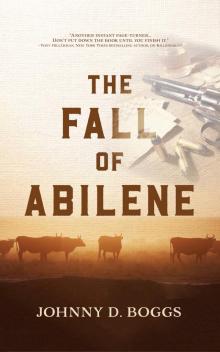 The Fall of Abilene
The Fall of Abilene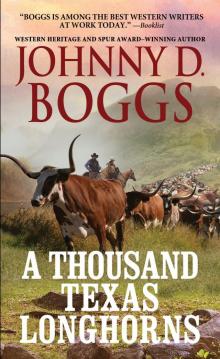 A Thousand Texas Longhorns
A Thousand Texas Longhorns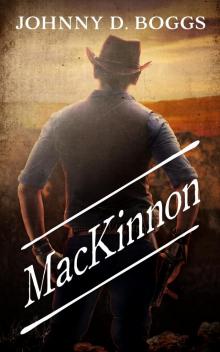 MacKinnon
MacKinnon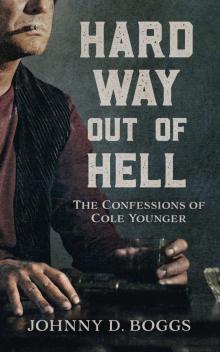 Hard Way Out of Hell
Hard Way Out of Hell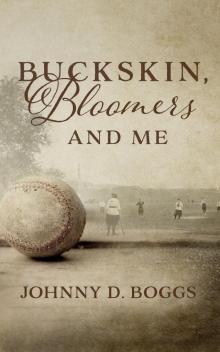 Buckskin, Bloomers, and Me
Buckskin, Bloomers, and Me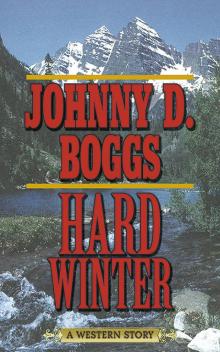 Hard Winter
Hard Winter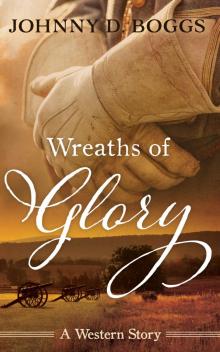 Wreaths of Glory
Wreaths of Glory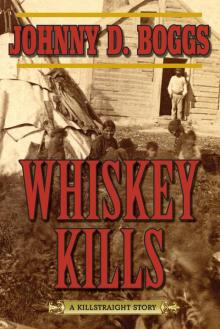 Whiskey Kills
Whiskey Kills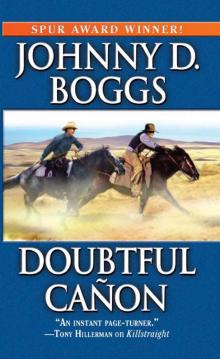 Doubtful Canon
Doubtful Canon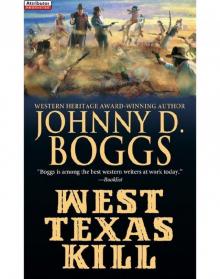 West Texas Kill
West Texas Kill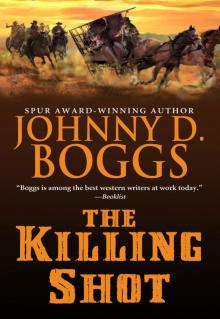 The Killing Shot
The Killing Shot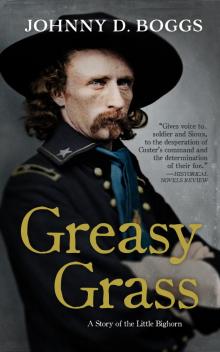 Greasy Grass
Greasy Grass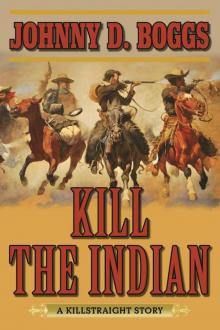 Kill the Indian
Kill the Indian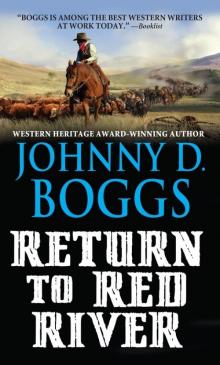 Return to Red River
Return to Red River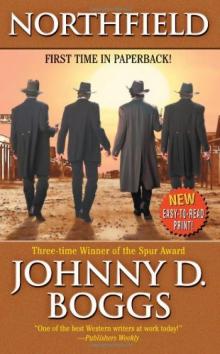 Northfield
Northfield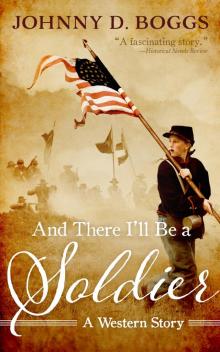 And There I’ll Be a Soldier
And There I’ll Be a Soldier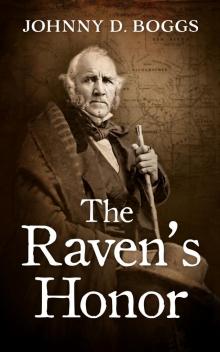 The Raven's Honor
The Raven's Honor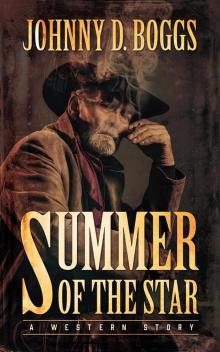 Summer of the Star
Summer of the Star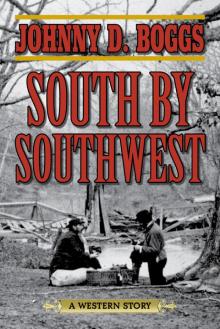 South by Southwest
South by Southwest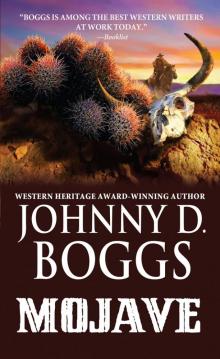 Mojave
Mojave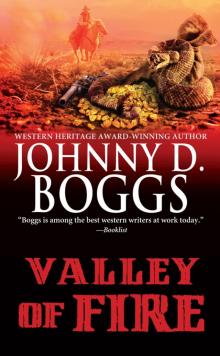 Valley of Fire
Valley of Fire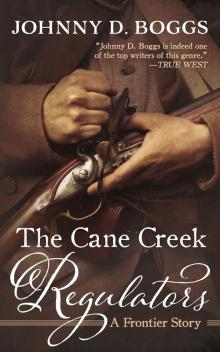 The Cane Creek Regulators
The Cane Creek Regulators